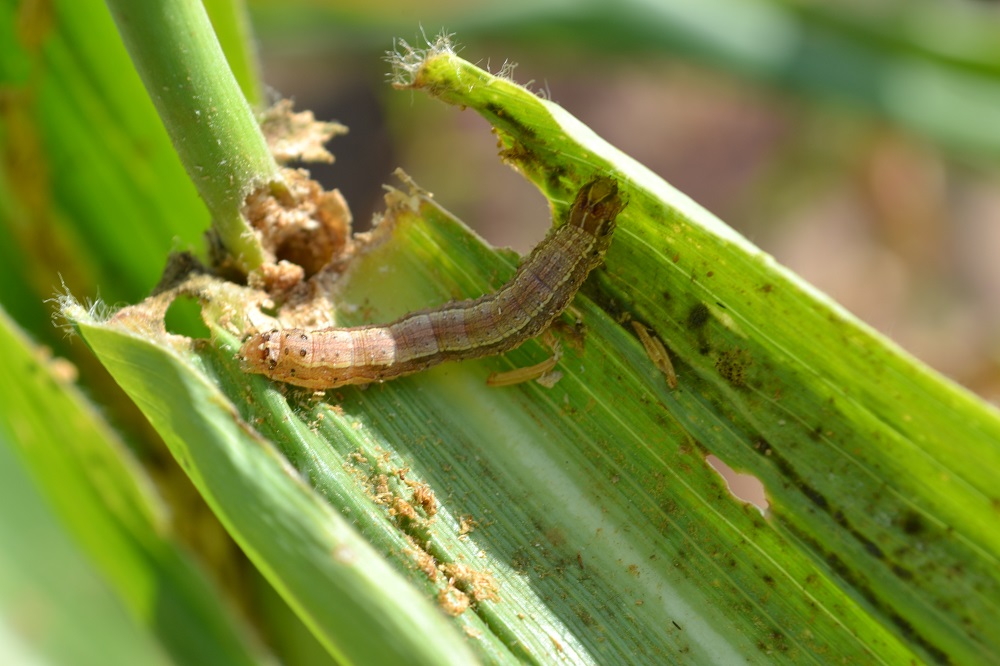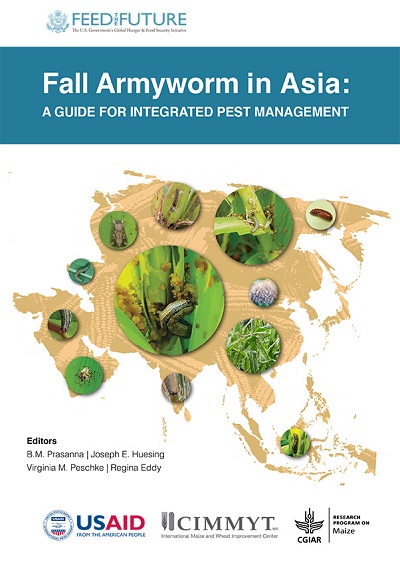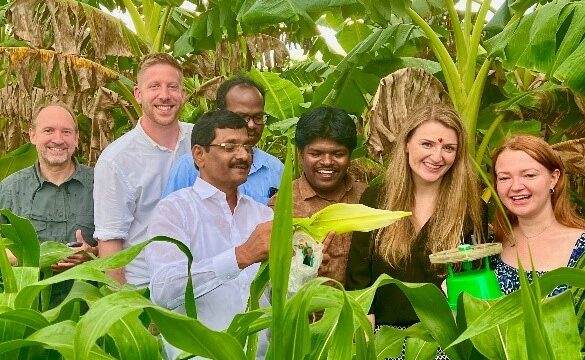
CABI experts in invasive alien species and extension communication have contributed to a major new guide for the integrated pest management (IPM) of the fall armyworm (Spodoptera frugiperda) in Asia.
The resource, ‘Fall Armyworm in Asia: A Guide for Integrated Pest Management,’ has been produced under the Feed the Future initiative of USAID, CIMMYT and CGIAR Research Program MAIZE and offers evidence-based sustainable approaches to tackling fall armyworm (FAW).
Since its arrival in Asia in mid-2018, the pest has already spread to over 15 countries on the continent and is a major threat to maize – used as food, feed and fodder –by millions of smallholder farmers who rely on the crop for their livelihoods.
It is feared that the FAW is likely to become endemic – due to the conducive environments offered by the region – and the guide is designed to help professionals in private and public plant protection organizations, extension agencies, research institutions and governments to support smallholder farmers to effectively monitor and manage the pest using IPM based approaches.
The guide features seven chapters focusing on practical knowledge and tools to control FAW in Asia. These include a chapter on fall armyworm scouting, action thresholds and monitoring, a chapter on host plant resistance in maize to FAW, and a chapter on biological control for FAW management in Asia.
Dr Roger Day, CABI’s Global Advisor, Plant Health, contributed to the first chapter: ‘Fall Armyworm in Asia: Invasion, Impacts, and Strategies for Sustainable Management,’ and Dr Malvika Chaudhary, Regional Coordinator Asia for the CABI-led Plantwise programme, and Tamsin Davis, Development Communications Specialist at CABI, provided their expertise to chapter seven: ‘Communications Framework for Integrated Pest Management of Fall Armyworm in Asia.’
In the guide’s forward, Rob Bertram, USAID Chief Scientist, Bureau for Resilience and Food Security, said, “FAW’s emergence in Asia is a high concern given that region contributes approximately 30% of global maize supplies, which are now at risk. Smallholder farmers are especially vulnerable, having limited access to the tools, technologies, and management practices that are necessary to sustainably manage the pest.
“I hope this document provides the knowledge critical to meeting the FAW challenge and look forward to expanding our partnerships with many of you as we exchange knowledge, innovations, and experience and move forward in the fight against fall armyworm.”
Shortly after the outbreak of FAW in India in 2018, USAID, CIMMYT and the Fall Armyworm Research-for-development (R4D) International Consortium organized a series of workshops and stakeholder consultations in several countries across Asia, including Bangladesh, Nepal, and India.
Governments in Asia have also quickly responded to the challenge and set up National FAW Task Forces to rapidly mobilize actions to mitigate FAW damage. Several public- and private-sector institutions in Asia have organized massive campaigns to bring awareness about the diagnosis and management of FAW.
The editors of the guide in their preface said, “There is an increasing understanding that the pest needs to be sustainably managed, along with other maize pests, using an integrated pest management (IPM) strategy, without damaging human and animal health and the environment.
“Similar to our approach in formulating the FAW Technical Guide for Africa in 2018, development of this publication is guided by the Rome Principles developed by leaders at the 2009 World Summit on Food Security to guide urgent action to eradicate hunger.”
Additional information
Main image: Fall armyworm on maize (Credit: CABI).
Full guide reference
B.M. Prasanna, Joseph E. Huesing, Virginia M. Peschke, Regina Eddy (eds). 2021. Fall Armyworm in Asia: A Guide for Integrated Pest Management. Mexico, CDMX: CIMMYT.

You can access the full document here.
CIMMYT has also published an announcement of the guide launch which can be read here.
Related News & Blogs
Biological control in action: Zambia’s field days on fighting fall armyworm
Experts from CABI recently held two field days and an expo in Zambia, showcasing innovative approaches to pest management to 584 farmers, agro-dealers and other stakeholders to help raise awareness of approaches to tackle the invasive fall armyworm (Sp…
11 June 2025




